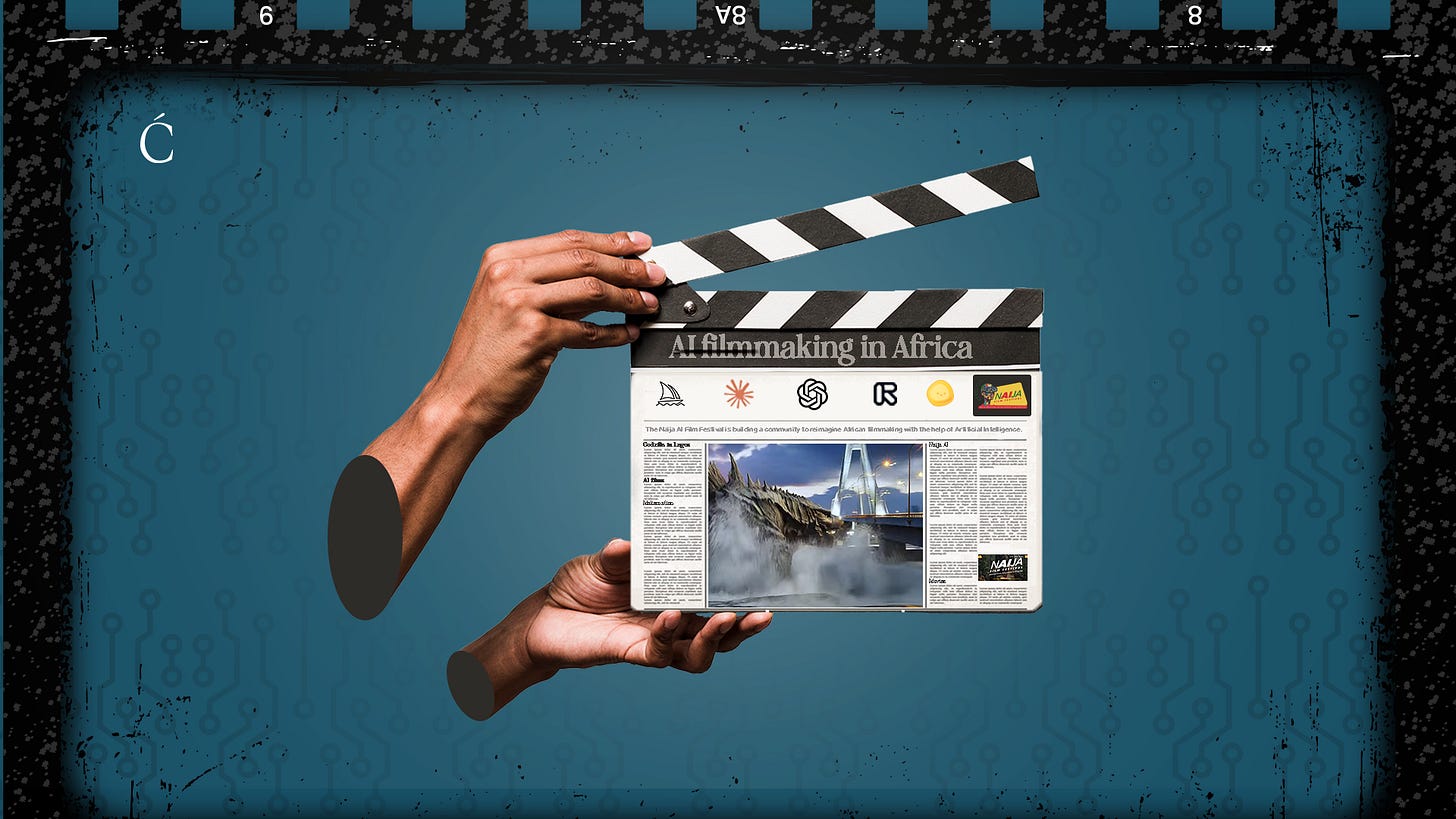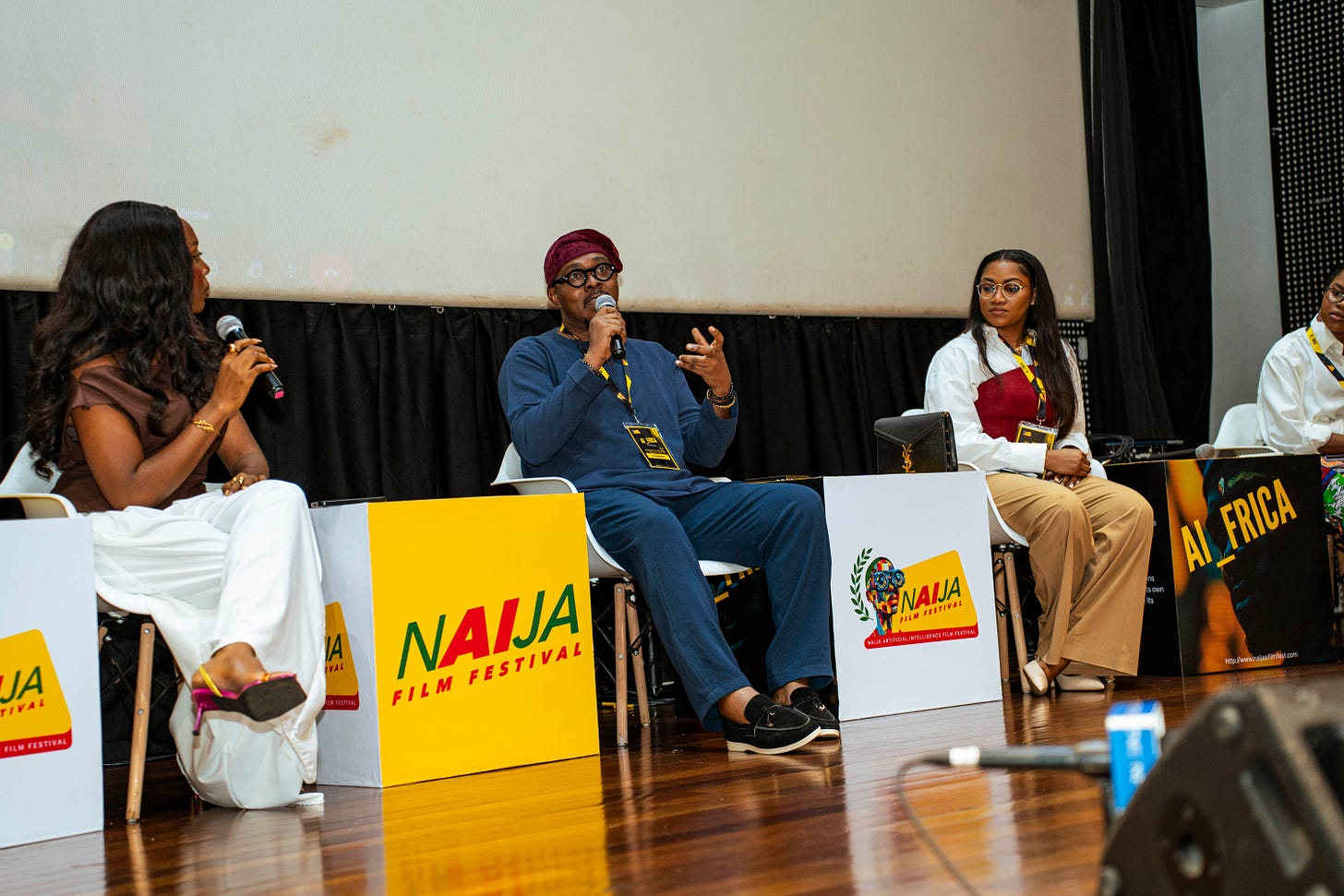Communiqué 89: AI filmmaking in Africa finally has a ground zero
The Naija AI Film Festival is building a community to reimagine African filmmaking with the help of Artificial Intelligence.
Why this matters
The festival is building a community and knowledge base, creating an entry point for startups, investors, and entrepreneurs to shape Africa’s creative economy around AI.
Early involvement allows stakeholders to shape ethical standards, intellectual property frameworks, and monetization models that will define the future
1. Africa’s AI debut
Earlier in September, hundreds of filmmakers and technologists gathered at Alliance Française in Lagos for a milestone event: Africa’s first AI film festival. The programme featured a global showcase of AI-assisted films, panel discussions on the future of AI filmmaking, a showcase of local AI tools, and an awards night to recognise outstanding work.
The finalists were chosen by a jury that reflected both global expertise and local experience, including international filmmaker Dana Verde, Uche Okiya, senior animation lecturer at the Del York Creative Academy, Anthony Adah, professor of film studies, actress and director Ronya Man, and Moniepoint’s former creative director, Yemi Arawore.
The festival climaxed with an awards ceremony. Godzilla in Lagos, a five-minute short from AI film studio Nirvs AI, took home the prize for Best AI Long-Form Film. The film reimagined Godzilla through a distinctly African lens, blending the spectacle of Hollywood with the chaos and character of Lagos. That fusion hinted at the radical potential of AI for African cinema: to lower barriers in production and allow African storytellers to compete on the same canvas as their global peers without waiting for the budgets or infrastructure typically required for traditional filmmaking. The Naija AI Film Festival was the platform making this potential a reality.
2. The backstory
Earlier this April, Nigeria witnessed another first. Makemation, the country’s first AI-assisted feature film, premiered in cinemas with a star-studded cast that included Richard Mofe-Damijo, Shaffy Bello, and Jide Kosoko. Within four days, the film grossed ₦32 million at the box office, climbing to third place nationwide, just behind Ryan Coogler’s Sinners and Ori: The Rebirth.
But even as Makemation was making waves on the big screen, Obinna Okerekeocha, film producer and convener of the Naija AI Film Festival, was making plans for the future of AI-assisted filmmaking on the continent. Just days earlier, on his birthday, he had quietly launched the Naija AI Film Festival.
Okerekeocha’s journey into filmmaking stretches back nearly two decades, beginning with his work at NN24, Nigeria’s first 24-hour news channel. As part of the pioneer staff, he honed his skills in round-the-clock media production. That early immersion in broadcast television would later serve as a foundation for his transition to the entertainment and film industry.
His most defining stint came at RED TV, where he spent seven years as creative director. There, he worked on birthing some of Nigeria’s most notable digital-first shows, serving as executive and creative producer on titles like The Men’s Club, Assistant Madams, Inspector K, and a range of docuseries and reality programmes. That period established him within Nigeria’s content and filmmaking space.
At the same time, Nollywood was in flux. Streaming platforms were recalibrating their strategies in Nigeria, pulling back from aggressive investments just as AI was disrupting the global film industry. Okerekeocha believed that once the dust settled, AI would play a vital role across the filmmaking value chain, from talent discovery to production and even distribution. Yet there was no platform on the continent to explore this convergence. The Naija AI Film Festival was his answer. He began by building a community of AI filmmakers across Africa before opening submissions for the festival. The first edition of the festival received 490 submissions from across the world.
3. Taking a page from the Runway playbook
In 2023, AI startup Runway launched the world’s first AI Film Festival to showcase films made with generative AI tools. Over the last two years, the festival has grown exponentially. The first edition received only 300 submissions, but the most recent edition, held in June, received over 6,000 submissions with screenings in New York and Los Angeles. Ten films were selected for the festival, including More Tears Than Harm, by Malagasy filmmaker Herinarivo Rakotomanana. Following the success of the festival, IMAX struck a deal with Runway to show the films in cinemas across 10 cities in the US.
Earlier this year, the Oscars officially clarified that it would treat films made with AI the same as traditional films, signalling a global acceptance of AI as a part of the filmmaking process.
But in Africa, despite successes like Makemation, adoption has been more cautious. In Nigeria in particular, a 2024 survey of film and television professionals by DLA Piper Africa, a consortium of law firms, found that 35% already use generative AI tools in their work, while another 35% were considering adoption. The Naija AI Film Festival aims to speed things up.
Film festivals have always been more than film screenings. They serve as laboratories where art, commerce, and culture collide to help enable a particular subculture of filmmaking. For instance, Sundance legitimised independent filmmaking and Cannes positioned cinema as an instrument of cultural diplomacy. The Naija AI Film Festival took its first steps toward establishing a similar framework for AI-assisted storytelling, thereby defining its role in the continent’s creative economy.
At its core, the festival was about showing what was possible. Filmmakers who use AI tools to write dialogue, render characters, and generate worlds were validated. Their works, no longer dismissed as gimmicks, were placed in conversation with human-made films and debated in panels about creativity and ownership. The festival also served as an industry showcase for local AI tools such as Switch Studio and AIstudio.ng. It also included Gen Jam, a training session where attendees were taught AI filmmaking techniques and allowed to create an AI film from scratch within four hours. Similarly, Runway hosts Gen 48, a rapid-fire filmmaking challenge that provides participants with free access to its AI tools for 48 hours to create a short film from scratch.
More critically, the festival created space to debate the policy and ethical issues—such as copyright, labour, and authenticity—that will shape the medium’s future. Media and entertainment lawyer Foza Fawehinmi, speaking on a panel about the ethical use of AI, emphasised the need to incorporate African source material in AI training models before focusing on monetisation. “If our stories are not included, these tools will not serve African creators. It’s not always about who gets what or who gets paid.”
4. The endgame
But beyond the festival, the real work lies in what comes after. For Okerekeocha, that work is rooted in community. Since its inception in April, the Naija AI Film community has grown to more than 500 members across the continent, creating an environment where filmmakers can learn and experiment with AI, supported by shared resources, guest lectures, and weekly portfolio reviews.
Okerekeocha is now moving to standardise that learning experience with a structured training platform. “We are building a portal where African filmmakers can learn AI filmmaking in one month, through modules that touch on the most important aspects of AI filmmaking from an African point of view.”
He wants to unlock the ability for African filmmakers to tell unique African stories. “I tell my community members, you are not learning AI to go and do the next Avatar film or the next James Bond. What are the African stories that have not yet been told that you can make with technology?”
That question—what stories have not yet been told—is what gives the Naija AI Film Festival its significance. It is less about the novelty of a new technology and more about its potential to widen the canvas for African storytelling. The festival was just the beginning; the real story is in what comes after.
Thank you for reading Communiqué! Help us give Africa’s media and creative industries the coverage it deserves by making a donation here.




